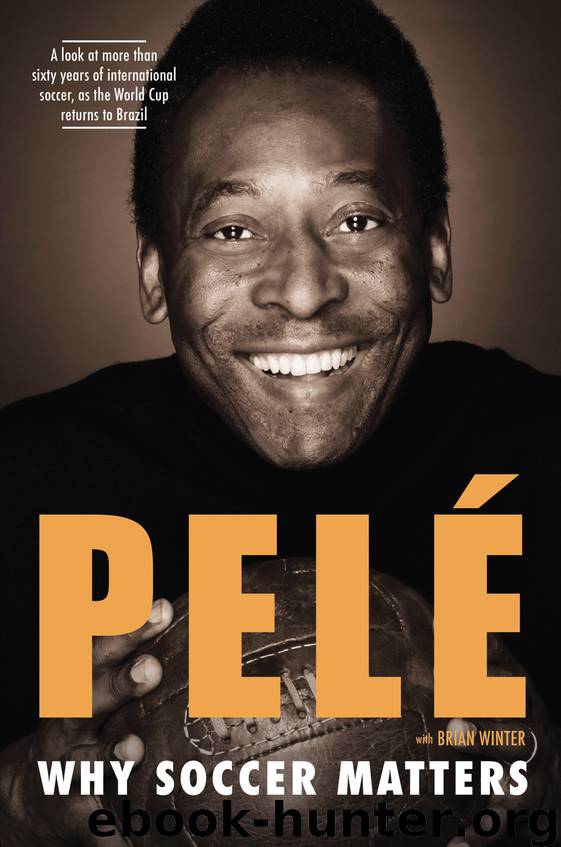Why Soccer Matters by Pelé

Author:Pelé
Language: eng
Format: epub
Publisher: Penguin Group US
Published: 2014-03-31T16:00:00+00:00
10
Well, easier said than done!
In early 1969, a little more than a year before we were to leave for Mexico, the directors surprised us by bringing in a new coach: João Saldanha. Saldanha was a well-known journalist who had been one of the loudest critics of our chaotic, overconfident approach in 1966. He was a charismatic whirlwind of a man, always well-spoken and very sure of himself. Whereas the previous coaches seemed afraid to offend anyone by committing to one player or another, Saldanha declared right away that he was going to select a core group of players and stick with them.
“My team is made of eleven beasts who are ready for anything,” Saldanha told his former colleagues in the press. “They’ll stick with me until the end. It’s glory or bust!”
Thus, we became known as “Saldanha’s Beasts.” And in the beginning, it seemed like a pretty good mix. Rather than trying to pick an all-star team of Brazilian players, Saldanha wanted to foster unity by putting together a core from just a few club teams. By selecting clusters of players who already knew one another, we’d solve the issues of chemistry we’d had in the past. So many of us came from Santos and Botafogo, the two best club teams of the era. We won almost all of our games in 1969, beating all six of our opponents in the qualifying round—which had never been done before.
Unfortunately, Saldanha also had a dark side. What seemed like confidence in the beginning turned into a dangerous, erratic arrogance. He was very volatile, and everybody knew that he liked to drink. The New York Times described him in a long profile piece as “outspoken, quick-tempered, aggressive and Quixotic.” He developed a habit of berating anyone in the press, or even in the stands, who dared to question his coaching. In one notorious incident, Saldanha was so angered by criticism from a club team coach in Rio that he reportedly went after the guy with a gun. It was a miracle that nobody got hurt.
The intrigue began to take its toll on the field. At the end of the year, we lost a friendly match against Atlético Mineiro—the club team Dondinho had auditioned for back in 1942—by a 2–1 score. We lost 2–0 to Argentina at a game in Porto Alegre, in southern Brazil. Meanwhile, Saldanha traveled to Mexico and Europe to scout our future opponents. Upon his return, he started randomly cutting some players from the squad and inviting others, breaking up the core that, all things considered, was still playing pretty well.
This time, I resolved not to repeat my mistakes from 1966—I would not be the quiet superstar any longer. I had learned my lesson, and I decided to speak up. I tried first to talk directly to Saldanha, but I couldn’t even get him to sit down with me. So, somewhat reluctantly, I went to the press instead. “Isn’t it a little early to be making so many changes to the team?” I said.
Download
This site does not store any files on its server. We only index and link to content provided by other sites. Please contact the content providers to delete copyright contents if any and email us, we'll remove relevant links or contents immediately.
Periodization Training for Sports by Tudor Bompa(8276)
Bodyweight Strength Training by Jay Cardiello(7918)
Therapeutic Modalities for Musculoskeletal Injuries, 4E by Craig R. Denegar & Ethan Saliba & Susan Saliba(7722)
Born to Run: by Christopher McDougall(7130)
Imperfect by Sanjay Manjrekar(5880)
Wiseguy by Nicholas Pileggi(5791)
Shoe Dog by Phil Knight(5271)
Paper Towns by Green John(5194)
The Body: A Guide for Occupants by Bill Bryson(5100)
The Rules Do Not Apply by Ariel Levy(4972)
Tuesdays with Morrie by Mitch Albom(4788)
Endurance: Shackleton's Incredible Voyage by Alfred Lansing(4785)
Bodyweight Strength Training Anatomy by Bret Contreras(4687)
The Sports Rules Book by Human Kinetics(4393)
Yoga Anatomy by Kaminoff Leslie(4368)
Machine Learning at Scale with H2O by Gregory Keys | David Whiting(4314)
Dynamic Alignment Through Imagery by Eric Franklin(4218)
Science and Development of Muscle Hypertrophy by Brad Schoenfeld(4136)
Exercise Technique Manual for Resistance Training by National Strength & Conditioning Association(4075)
